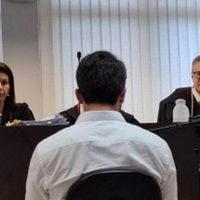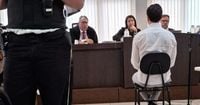In a significant ruling that has captured public attention, engineer Rafael Batista Bicalho, 28, was sentenced to five years and five months in prison for the attempted murder of Henrique Figueiredo Papini de Morais, 30. The verdict was delivered in a jury trial that concluded in the early hours of March 28, 2025, in Belo Horizonte, Brazil. This case, which has been ongoing since the violent incident in September 2016, has stirred emotions and raised questions about justice and accountability.
The crime occurred outside the Hangar 677 nightclub in the Olhos d'Água neighborhood, where Papini, then a 22-year-old medical student, was brutally attacked. Witnesses reported that Bicalho and his accomplices chased Papini and assaulted him with punches and kicks, primarily targeting his head. The attack was reportedly motivated by jealousy, as Papini had been seen with Bicalho's ex-girlfriend.
During the trial, which began on March 27, 2025, Bicalho faced charges of attempted triple-qualified homicide, a serious accusation reflecting the severity of the crime. The jury, composed of four women and three men, deliberated for approximately 15 hours before reaching a verdict. Judge Luiz Felipe Sampaio Aranha presided over the case, emphasizing the gravity of the situation and denying Bicalho the right to appeal while remaining free.
Evidence presented during the trial revealed that Papini suffered significant injuries from the assault, including facial paralysis, hearing loss in his left ear, and permanent damage to his left eye. The victim spent over 28 days in the hospital, during which he fell into a coma for two days and developed bacterial meningitis. The repercussions of the attack have profoundly affected Papini's life, forcing him to adjust to new realities, including difficulties with balance and speech.
In his testimony, Papini recounted the traumatic experience, stating, "I always wake up and remember. Every time I look in the mirror, I remember." He expressed the emotional toll of his injuries, particularly the inability to smile, which has robbed him of his former joy and happiness.
Bicalho's defense team, led by attorney Zanone de Oliveira Júnior, attempted to argue that the incident was not premeditated and that it stemmed from a spontaneous fight rather than an intent to kill. Bicalho himself testified that he approached Papini after the nightclub incident to confront him about his ex-girlfriend. He claimed that the situation escalated into a physical altercation, but he did not intend for it to become as violent as it did.
Despite the defense's arguments, Bicalho was the only one of the four initial defendants to be convicted. The other three were acquitted during the trial, leading to questions about the nature of the attack and whether it was indeed a coordinated effort or a momentary lapse in judgment. The prosecution maintained that the evidence clearly indicated Bicalho's intent to harm, asserting that Papini's survival was only possible due to the timely intervention of bystanders.
Henrique Papini's journey through this ordeal has been marked by a relentless pursuit of justice. He had previously expressed his frustrations about the lengthy legal process, stating, "It has been eight years waiting, with a lot of anxiety and struggle. We never gave up, always asking for justice." His determination and the support from family and friends played a crucial role in bringing the case to trial.
As the trial unfolded, the emotional weight of the case was palpable. Family members and supporters of Papini gathered outside the courtroom, holding signs and chanting for justice. They reflected the community's outrage over the attack and the long-awaited resolution to a case that has lingered in public consciousness.
Following the verdict, Bicalho will serve his sentence in a semi-open regime, which allows for some freedoms but also imposes strict conditions. The decision to deny him the right to appeal in freedom underscores the court's stance on the seriousness of the crime and the need for accountability.
In the aftermath of the trial, the implications of this case extend beyond the individuals involved. It raises broader questions about violence, jealousy, and the consequences of unchecked aggression in society. The community in Belo Horizonte has been left to grapple with the realities of such violence, and the hope is that this verdict serves as a reminder of the importance of justice and the protection of victims.
As for Henrique Papini, he has emerged from this harrowing experience not only as a survivor but also as a symbol of resilience. His story serves as a cautionary tale about the dangers of jealousy and violence, reminding us all of the importance of empathy and understanding in our interactions with others.
Ultimately, the conclusion of this case marks a significant chapter in the ongoing fight for justice, highlighting the need for continued vigilance against violence and the importance of supporting victims in their journeys toward healing.










